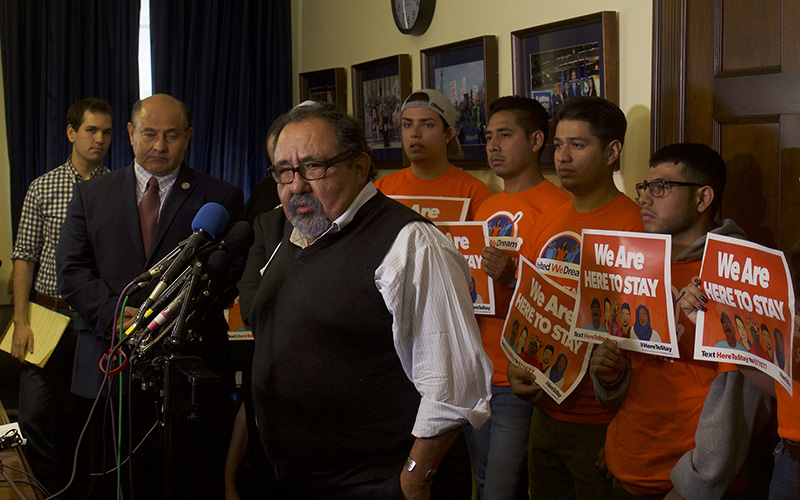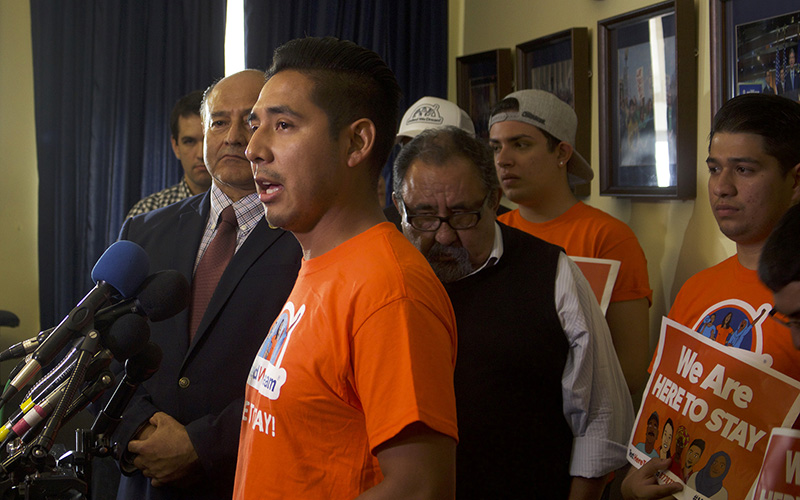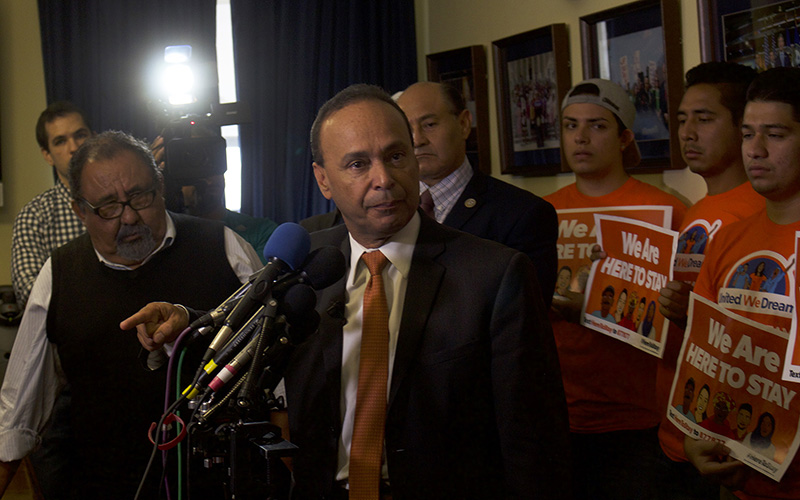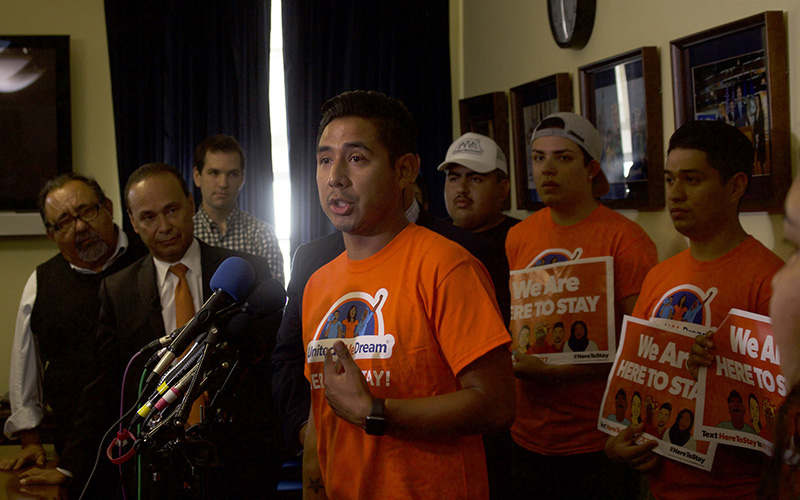
Rep. Raul Grijalva, D-Tucson, said that Democrats “have to be prepared to take that risk” to shut down the government in December to force a vote on the DREAM Act. “Unless we get the DREAM Act, then nothing else moves,” he said. (Photo by Andrew Nicla/Cronkite News)

Former Phoenix resident Hugo Juarez said that if the DREAM Act is not passed when DACA expires in March, immigrants like him will be in jeopardy. He came to lobby for the bill and send a message he is “here to stay” and fight for citizenship. (Photo by Andrew Nicla/Cronkite News)

Rep. Luis Gutierrez, D-Illinois, said that despite Republican majorities in the House and Senate, he thinks Democrats can force a DREAM Act vote because the Democratic Caucus has “all of the power and the leverage now.” (Photo by Andrew Nicla/Cronkite News)

Hugo Juarez was brought to the U.S. as a child. The DACA recipient said he came to Washington to lobby openly for passage of the DREAM Act because “I’m not going to hide. I hid for 10 years in Phoenix – not anymore.” (Photo by Andrew Nicla/Cronkite News)
WASHINGTON – Hispanic House members took a page from President Donald Trump’s playbook Friday, saying they are willing to risk a government shutdown later this year if they cannot get a vote on the DREAM Act.
Democratic Reps. Raul Grijalva of Tucson and Luis Gutierrez of Illinois said the “vast majority” of Democrats are behind the idea of using the budget as leverage for a vote. They spoke at an event with several beneficiaries of the Deferred Action for Childhood Arrivals program that the Trump administration said this week it plans to rescind over the next six months.
The DREAM Act would put into law many of the protections of DACA, which has benefited about 800,000 immigrants, an estimated 28,000 in Arizona.
“Come December when the debt ceiling is up again … the commitment that we’re making to these young people here today and the 800,000, possibly 2 million aging, into qualifying for the DREAM Act, that budget, without Democratic support doesn’t pass, the debt ceiling doesn’t get risen, then we have another drama on our hands,” Grijalva said.
His comments came just hours after the House approved a measure to continue funding government operations through early December and to raise the debt ceiling to allow the government to continue borrowing. Without those measures, there was a possibility that the government could have shut down at the end of September when the current budget expired and borrowing authority ran out.
-Cronkite News video by Adrienne St. Clair
During a rally in Phoenix last month, Trump had threatened to use a government shutdown to get Congress to include funding for border wall construction in the fiscal 2018 budget currently being debated.
He later backed off that threat. But Grijalva and Gutierrez said Friday they would use the same tactic if they cannot get a vote on the DREAM Act by Dec. 15.
“The Republicans have to give us a clean vote on the DREAM Act, which almost certainly would pass, then we can avoid that consequence,” of a shutdown, Grijalva said. “We have to be prepared to take that risk and say unless we get the DREAM Act, then nothing else moves.”
Grijalva said Democratic leaders in the House told him they support the approach of leveraging a vote with the threat of a government shutdown. Gutierrez said that while the GOP holds the majority in both houses of Congress, “all of the power and the leverage now is with us in the Democratic Caucus.”
“We know there is no raising of the debt ceiling, there is no opening up of the government unless Democrats cooperate and are co-opted in the process,” Gutierrez said. “You want to put them at risk, Speaker (Paul) Ryan? Then deny a peaceful and a secure place for our DREAMers.”
Their comments come three days after the Trump administration announced plans to phase out DACA, which gave temporary protective status to immigrants who were brought to the U.S. illegally while they were children. Critics said the program, enacted in 2012 by President Barack Obama through an executive order, was an unconstitutional overreach of executive power and needed to be revoked.
Attorney General Jeff Sessions Trump announced Tuesday that the administration would begin to cut off applications for DACA renewals next month, and would eventually end the program in March. As the announcement was made, Trump called on Congress to use the six months to act on a “constitutional” replacement for DACA.
Government officials insist that DACA recipients will not be targeted for deportation after the program ends, and Trump has since tried to reassure recipients.
“For all of those (DACA) that are concerned about your status during the 6 month period, you have nothing to worry about – No action!” he said in a tweet Thursday.
For all of those (DACA) that are concerned about your status during the 6 month period, you have nothing to worry about – No action!
— Donald J. Trump (@realDonaldTrump) September 7, 2017
The tweet does not change the fact that, once their permits expire, DACA recipients will still be subject to deportation, even if they are not a priority for removal.
That uncertainty brought DACA recipient Hugo Juarez, a former Phoenix resident, to Washington this week to lobby with United We Dream on the DREAM Act.
Juarez was 12 when he crossed the border with his mother and three siblings, settling in Phoenix until the family decided to move to Colorado after the passage of Arizona’s SB 1070, the “papers please” law that required that police officers determine a suspect’s immigration status.
Juarez said Friday that if legislation is not passed before DACA is revoked, he and others like him are in jeopardy. He said the group wanted to send the message that they are productive people who contribute to their communities, human beings who are “here to stay” and willing to fight for citizenship.
“Regardless of what Donald Trump has said, we’re here because we serve a purpose,” Juarez said. “I don’t think any human being should be deciding how to live our lives or that we should be in fear. I’m not going to hide. I hid for 10 years in Phoenix – not anymore.”
While he is optimistic that a legislative solution will be reached, he and the other DACA recipients here will continue to push for a vote on a DREAM Act that Grijalva said “would almost certainly pass” if it is allowed to come up for a vote.